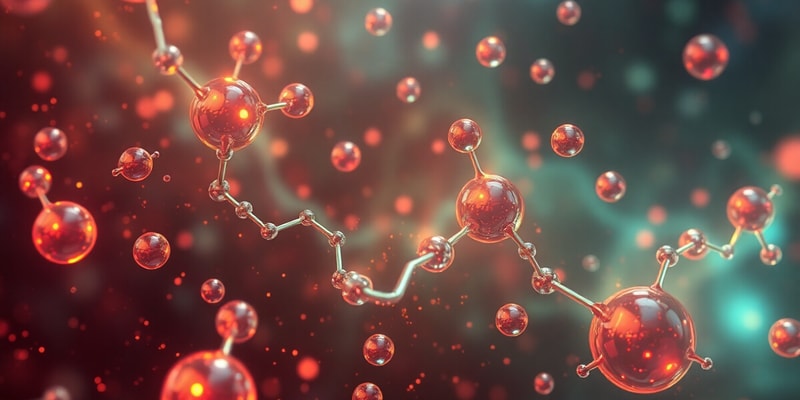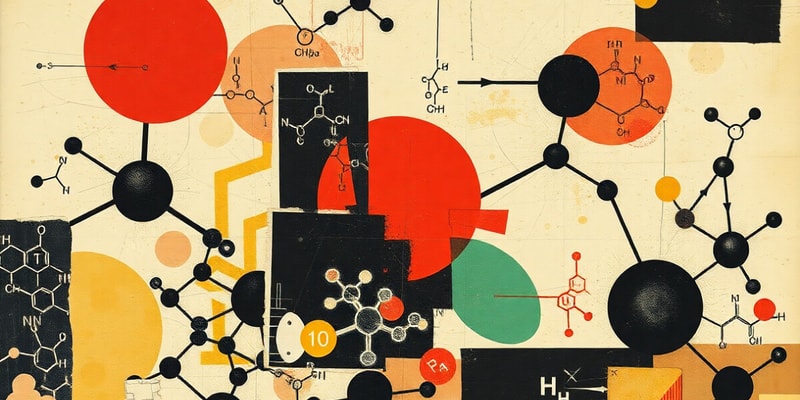Podcast
Questions and Answers
What are the first 6 hydrocarbons in the alkane series?
What are the first 6 hydrocarbons in the alkane series?
Methane, Ethane, Propane, Butane, Pentane, Hexane
What are the first 6 hydrocarbons in the alkene series?
What are the first 6 hydrocarbons in the alkene series?
Ethene, Propene, Butene, Pentene, Hexene, Heptene
What are the first 6 hydrocarbons in the alkyne series?
What are the first 6 hydrocarbons in the alkyne series?
Ethyne, Propyne, Butyne, Pentyne, Hexyne, Heptyne
Write the structural and molecular formula for propene.
Write the structural and molecular formula for propene.
Signup and view all the answers
Write the structural and molecular formula for hexyne.
Write the structural and molecular formula for hexyne.
Signup and view all the answers
Write the structural and molecular formula for pentane.
Write the structural and molecular formula for pentane.
Signup and view all the answers
Write the structural and molecular formula for ethene.
Write the structural and molecular formula for ethene.
Signup and view all the answers
What is the name of this molecule: C2H4?
What is the name of this molecule: C2H4?
Signup and view all the answers
What is the name of this molecule: C3H6?
What is the name of this molecule: C3H6?
Signup and view all the answers
What is the name of this molecule: C6H10?
What is the name of this molecule: C6H10?
Signup and view all the answers
Is butane saturated or unsaturated?
Is butane saturated or unsaturated?
Signup and view all the answers
Is ethene saturated or unsaturated?
Is ethene saturated or unsaturated?
Signup and view all the answers
Which of these molecules will have a higher melting and boiling point?
Which of these molecules will have a higher melting and boiling point?
Signup and view all the answers
Which molecule will have a higher melting and boiling point?
Which molecule will have a higher melting and boiling point?
Signup and view all the answers
Study Notes
Hydrocarbons
- Hydrocarbons are organic molecules made up of only carbon and hydrogen atoms.
- The more carbon atoms a hydrocarbon has, the higher its melting and boiling point.
- Hydrocarbons can be found in a variety of states at room temperature, including gas (methane), liquid (pentane), and solid (octadecane).
Uses of Hydrocarbons
- Hydrocarbons have many uses, including:
- Fuels: They are used as fuels for transportation (vehicles, airplanes) and heating purposes (gas for stoves, butane lighters).
- Solvents: They are used as solvents to dissolve substances like nail polish remover.
- Plastics: Some hydrocarbons are used as raw materials for making plastics.
- Flavors and perfumes: Some hydrocarbons are used to create flavors (vanilla) and perfumes.
- Asphalt: Asphalt pavement is made of hydrocarbons found in crude oil.
Sources of Hydrocarbons
- Hydrocarbons are naturally occurring and come from various sources including:
- Natural gas: Natural gas is a mixture of hydrocarbons, primarily methane.
- Crude oil: Crude oil is a complex mixture of hydrocarbons from which many different products are refined.
- Petroleum: Petroleum is another name for crude oil.
Types of Hydrocarbons
- Alkanes: These are saturated hydrocarbons, meaning that they have single bonds between carbon atoms.
- Alkenes: These are unsaturated hydrocarbons with at least one double bond between carbon atoms.
- Alkynes: These are unsaturated hydrocarbons with at least one triple bond between carbon atoms.
Properties and Uses of Different Hydrocarbon Types
-
Alkanes:
- Uses: Fuels, motor oil, asphalt, solvents
-
Alkenes:
- Uses: Fuels, raw material for making plastics, ripening fruit (ethene)
-
Alkynes:
- Uses: Welding gas
Studying That Suits You
Use AI to generate personalized quizzes and flashcards to suit your learning preferences.
Related Documents
Description
This quiz covers the basics of hydrocarbons, including their structure, uses, and sources. Learn about the different states of hydrocarbons at room temperature and their significance in everyday life from fuels to plastics. Test your knowledge on this essential organic compound.




